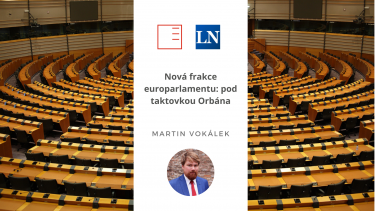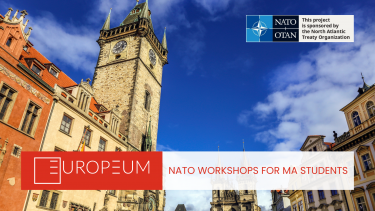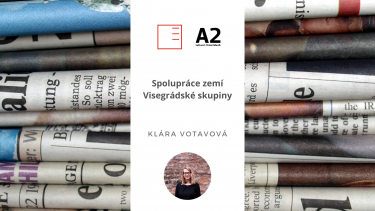Lidovky.cz | New political group in the European Parliament: under the baton of Orbán
Visegrad sovereigntists. This is the name given by European circles to the upcoming new faction of the European Parliament, which is expected to include seven MEPs from the Czech ANO movement. The leader of the Czech opposition, Andrej Babiš, who led his MEPs out of the influential liberal Renew Europe, is working with Hungarian Prime Minister Viktor Orbán to establish the new group. Martin Vokálek, director of EUROPEUM Institute, comments on its formation.
Show more
Call for Participants: Euro-Atlantic Future of Ukraine and Eastern Europe: Views from Visegrad
Are you a Master’s student from the Czech Republic, Hungary, Poland, Slovakia keen on international relations and NATO's strategic future? Join our workshop series to engage with experts, present your views on NATO’s Open-Door policy, and network with peers from the region.
Show more
A2 | Cooperation of the Visegrad Group
Cooperation inside the Visegrad Group depends on the political situation of each country. In recent years, the alliance has drawn attention to itself with its criticism of the southern European states and anti-immigrant rhetoric. Klára Votavová, a researcher at EUROPEUM Institute, wrote her commentary for the biweekly A2.
Show moreThink Visegrad Fellowship offer: Call for proposals 2024
The Think Visegrad platform, which brings together think tanks from the Visegrad countries, including the EUROPEUM Institute for European Policy, is offering eight visiting fellowships to non-Visegrad expert fellows for the period Summer/Autumn/Winter of 2024. The duration of fellowships varies from 6 to 8 weeks (based on agreement with the hosting institute).
Show moreThink Visegrad Fellowship offer: Call for proposals 2024
The Think Visegrad platform, which brings together think tanks from the Visegrad countries, including the EUROPEUM Institute for European Policy, is offering eight visiting fellowships to non-Visegrad expert fellows for the period Summer/Autumn/Winter of 2024. The duration of fellowships varies from 6 to 8 weeks (based on agreement with the hosting institute).
Show moreTN.cz | Meeting of the Visegrad Group Foreign Ministers
The current format of the Visegrad Group lacks common topics; the group fragmented into two pairs that have different opinions in many areas, particularly regarding the issue of Ukraine. However, the interests of Hungary and Slovakia are not in conflict with others, despite what their leaders claim. The conflict in the Middle East, where the Czech Republic is in the minority in its full support of Israel, was also discussed on this meeting. Viktor Daněk, deputy director of EUROPEUM Institute, commented on the situation within the V4 for TN Live.
Show moreRTVS | The Future of the Visegrad Group
Differences on key issues between the leaders of the Visegrad Four countries are now being widely discussed in the context of the ongoing summit in Prague. How the relations between the countries will develop, whether we are heading towards the disintegration of the V4 or whether this is an eternal partnership of reason, was analysed by Žiga Faktor, Deputy Director and Head of the Brussels Office, for the RTVS podcast Z prvej ruky.
Show more
RTVS | Summit of V4 Prime Ministers in Prague
Czech Prime Minister Petr Fiala and Polish Prime Minister Donald Tusk met separately ahead of the Visegrad Group summit in Prague, where the main points of discussion were the war in Ukraine and energy security. Vít Havelka, an analyst at EUROPEUM Institute, commented on the position of the Hungarian or Slovak Prime Minister and the overall direction of the Visegrad Group for Slovakian television RTVS.
Show more
TN.cz | Visegrad Group could unite over migration issue
The prime ministers of the Czech Republic, Slovakia, Poland and Hungary met in Prague to discuss the war in Ukraine and the future direction of the Visegrad Group. According to Viktor Daňek, deputy director of the EUROPEUM Institute, migration will be another possible common topic and Donald Tusk will become one of the most important politicians in Europe in the next years.
Show moreČT24 | V4 summit in Prague brought questions about the groups' necessity
The new Polish Prime Minister Donald Tusk came to the Prague V4 summit asking whether the Visegrad group is still relevant. Cooperation on a high political level is complicated by the countries' different approaches towards the war in Ukraine. While the Czech Republic and Poland continue to support its interests with the same intensity, Slovakia and Hungary are reassessing them. Martin Vokálek, Executive Director of the EUROPEUM Institute, talked about the importance of the summit and the relations between Poland and the Czech Republic for ČT24.
Show more
Staroměstské náměstí 4/1
Prague 1 - Staré Město
110 00
tel.: +420 212 246 552
email: europeum@europeum.org
https://www.europeum.org








